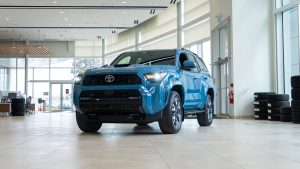Are you wondering how to budget for your next vehicle? Shopping for a vehicle is an exciting experience, but it can go a lot smoother when you have a clear budget planned out. Creating a budget helps you understand how much you can afford to spend, and it prepares you for the different costs associated with vehicle ownership. Here’s a guide on how to make a budget when shopping for a vehicle, along with some tips for individuals on a tight budget!
Key Components to Include in Your Vehicle Budget
1. Purchase Price
The purchase price is the most obvious cost when buying a car. It’s important to establish a maximum amount you’re willing to spend based on what you can afford. Consider both new and used vehicles and explore financing options if needed. If you’re working with a tight budget, purchasing a certified pre-owned or reconditioned vehicle can be a great way to save money while still getting a reliable car.
Read more: Used vs. Certified Pre-Owned Vehicles: What’s the Difference?
2. Down Payment
The larger your down payment, the less you’ll need to finance. This can lower your monthly payments and reduce the amount you’ll pay in interest over time. Aim for at least 10-20% of the vehicle’s purchase price as a down payment, if possible, but adjust this based on your financial situation. Down payments can also reduce your monthly lease payments, if leasing is the path for you.
Read more: Leasing Vs. Financing a Vehicle: Which is Best for You?
3. Monthly Payments
Whether you’re financing or leasing, Birchwood can help you calculate your monthly payments to ensure they fit within your budget. Experts recommend that car payments not exceed 10-15% of your monthly income. When financing, be sure to consider the loan term, as longer terms reduce monthly payments but may cost more in interest over time.
4. Insurance Costs
Insurance premiums can vary significantly based on factors like the type of vehicle, your driving history, and where you live. Get insurance quotes for the vehicles you’re considering to understand how they’ll impact your monthly expenses. Insurance is mandatory, so it’s important to factor this into your budget early on.
5. Fuel Costs
Gasoline or electric charging costs will be an ongoing expense. Research the fuel efficiency of the vehicles you’re considering and estimate your monthly fuel or charging expenses based on your driving habits. If you drive frequently, choosing a fuel-efficient or electric vehicle may save you money in the long run.
6. Maintenance and Repairs
Every vehicle requires maintenance, such as oil changes, tire rotations, and brake inspections. Set aside funds for regular maintenance and consider purchasing an extended warranty for unexpected repairs if you’re buying a used car. Birchwood’s service department can help you keep your vehicle in top condition!
7. Registration and Licensing Fees
Don’t forget to include registration and licensing fees, as these are required to legally operate your vehicle. Costs vary depending on your location, but they’re typically an annual expense.
8. Other Expenses
Consider any additional costs, such as parking permits or toll fees, that may come with vehicle ownership. These can add up quickly, especially if you live in an area with limited free parking.
Using the CAA Driving Cost Calculator
To help estimate these costs, you can use the CAA Driving Cost Calculator, a free tool that breaks down vehicle expenses based on your vehicle’s model and your driving habits. This tool helps to estimate ongoing costs like insurance, maintenance, license and registration, fuel costs, depreciation, and more!
By entering your province, the vehicle type, and annual mileage, the calculator will give you an estimate of monthly or yearly costs, helping you make a more informed decision before purchasing a car. This tool is especially useful for comparing fuel and maintenance costs between different models, such as electric versus gas vehicles.

Tips for Budget-Conscious Shoppers
Consider Used or Certified Pre-Owned Vehicles:
- Compared to used or certified pre-owned vehicles, new vehicles often lose value faster and have a higher upfront expense, making a used vehicle a better choice for shoppers on a budget. Birchwood offers a wide selection of certified pre-owned vehicles that are reconditioned and inspected for peace of mind.
Read more: Buying a New vs. Used Vehicle: Pros and Cons
Calculate the Total Cost of Ownership:
- Instead of focusing only on the purchase price, consider the total cost of ownership over time. A more affordable vehicle that has high fuel or maintenance costs might end up costing you more in the long run.
Read more: How to Calculate the Total Cost of Ownership of a Vehicle
Research Vehicle Depreciation Rates:
- Some vehicles retain their value better than others, which can save you money if you decide to sell or trade it in later. Look up depreciation rates for the models you’re interested in and consider resale value.
Prioritize Essential Features:
- If you’re on a tight budget, focus on the features that are essential for your needs rather than luxury add-ons. Safety features, fuel efficiency, and reliability should come first.
Creating a budget when vehicle shopping helps you make an informed decision and ensures you find a vehicle within your price range. Birchwood’s experts can help you find the best vehicle for your budget from our wide range of options, including certified pre-owned and used vehicles that have been reconditioned to provide quality and reliability. Start your vehicle shopping journey today!


